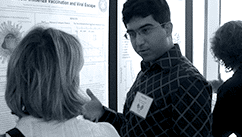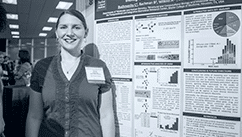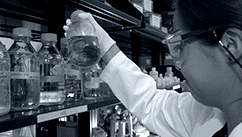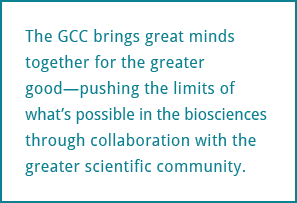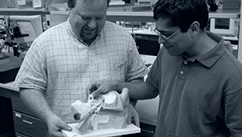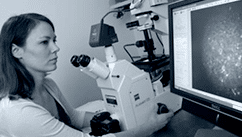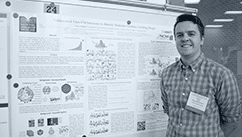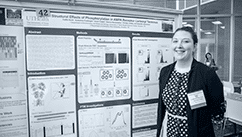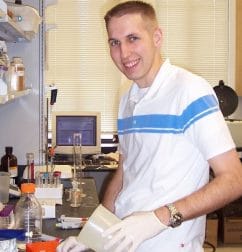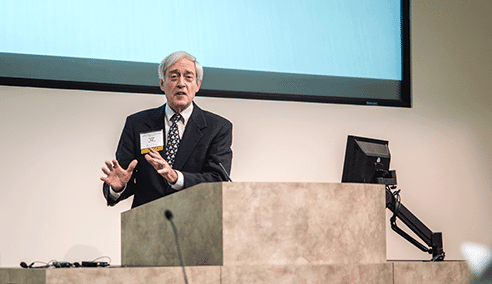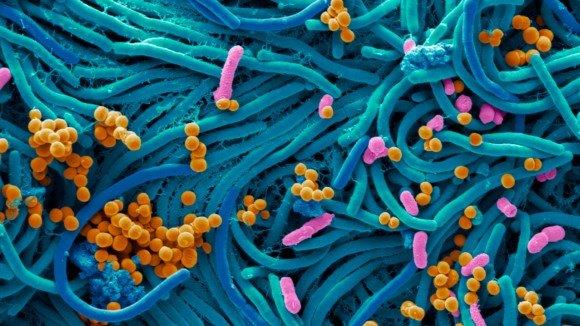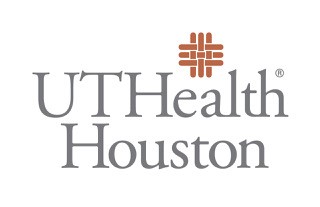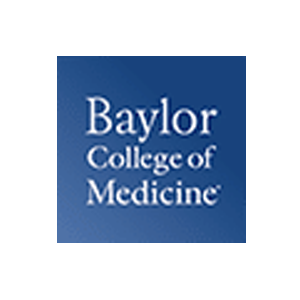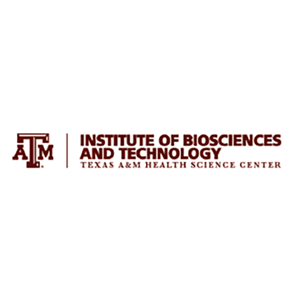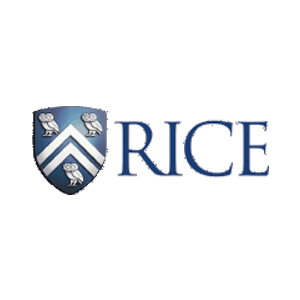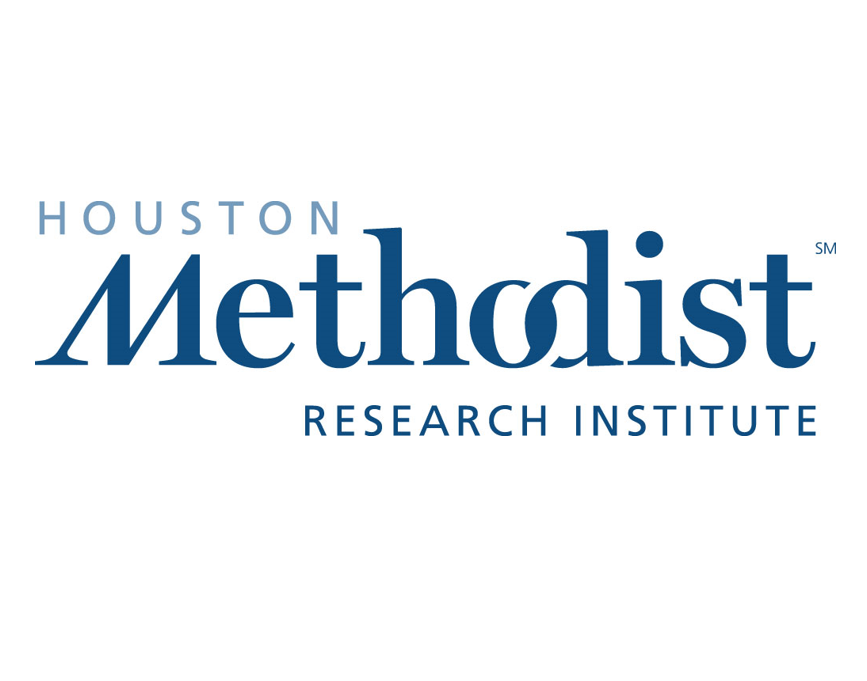Molecular Basis of Infectious Diseases (MBID)

MBID is funded by the National Institute of Allergy and Infectious Diseases (NIAID), T32 AI055449 to The University of Texas Health Science Center at Houston (UTHealth), renewed for a 3rd time for 8/2021-7/2026.
In the long-standing Molecular Basis of Infectious Diseases (MBID) training program, we focus on the development of microbiologists with the skills to advance our understanding of microbial pathogenesis and the ability to recognize opportunities for translation of that information into clinical applications.
The purpose of the MBID T32 is to
- provide an optimal environment for training new scientists in the latest concepts and techniques in microbiological research,
- enhance the understanding among young scientists of current challenges in clinical infectious diseases,
- prepare students for research careers in which they contribute to and influence research efforts that lead to effective solutions for important infectious disease issues.
Impact: The MBID training program grew out of the Molecular Basis of Infectious Diseases group, formed in the Texas Medical Center in 1996. Today the MBID group includes more than 400 faculty, postdoctoral fellows, graduate students, and research staff whose primary interest is in Infectious Disease research. Over many years, the synergy of the MBID T32 and the MBID group of researchers has created a thriving and dynamic Infectious Diseases community, with well-attended, jointly sponsored programs, including
- the MBID Data Club, held the 3rd Friday of the month at McGovern Medical School, features informal data presentations
- the MBID Research Retreat, held annually as a one-day meeting, features outstanding speakers, trainee talks and a poster session
Program Director:
Michael Lorenz
Professor and Chair, Microbiology and Molecular Genetics, UTHealth
Program Co-Directors:
Professor of Microbiology
Director, Center for Infectious and Inflammatory Diseases
Texas A&M Health Science Center
Associate Professor, BioSciences
CPRIT Scholar in Cancer Research Chair
Rice University
Administrative Support for this inter-institutional program is provided by the Gulf Coast Consortia/Keck Center Program Administrator Vicki Alger.
Participating Institutions
Applications for PhD students open April 8, 2025.
Trainee Eligibility
PhD students from UTHealth, MD Anderson Cancer Center (MDA), Baylor College of Medicine (BCM), Institute of Biosciences and Technology of Texas A&M (IBT), and Rice University (Rice) are eligible to apply.
- Students must be US citizens, or Permanent Residents with a valid Permanent Resident card.
- Students must have chosen their primary thesis advisor.
- Students may apply in their first, second or third year of graduate school.
- Students must select a mentor from the MBID Training Faculty (See list below.).
- The student’s dissertation project must involve molecular aspects of microbial pathogenesis or host interactions.
The Gulf Coast Consortia is committed to providing equal opportunity in training for individuals with disabilities and individuals from racial and ethnic groups who are currently underrepresented in STEM fields. We welcome applications from all qualified trainees, regardless of ethnic/racial status or disability status. All GCC member institutions are ADAAA compliant and have offices of disability support services that provide accommodations and support services to trainees, faculty, staff, and visitors.
The MBID training program includes the following elements:
1. Research project
Trainees will spend the greatest part of their training time engaged in original cutting-edge research, which culminates in peer-reviewed publications and first-class dissertations.
We encourage MBID trainees to select two or three MBID training faculty to serve on their thesis committee.
2. Strong core curriculum
Trainees take two MBID-specific classes:
-
-
-
- Seminar in Infectious Disease (GS07 1731)
- AMR Foundations Course: The AMR Foundations Course is focused primarily on the mechanisms of action and resistance of the most common antibiotics used in clinical practice, with important components related to antifungal resistance, genomics, microbiome science, the pharmacology of antibiotics, antibiotic stewardship and the important problem of C. difficile. These lectures will be for 1.15 hours, twice weekly during the fall semester, by Zoom. Trainees are expected to participate during their first year of appointment. Certificates of completion will be provided. AMR Course Fall 2025 schedule will be posted soon.
-
-
Trainees also select at least one “core” course from the list of offerings.
-
-
-
- At MDA/UTHealth GSBS:
Topics in Microbiology and Infectious Disease, Fundamental Immunology, Molecular Epidemiology and Microbial Genomics, Literature survey in Microbiology and Infectious Disease, Microbiology and Molecular Genetics Seminar Series, Student Research Seminar - At BCM:
The Microbiome, Concepts in Microbial Pathogenesis, Immunology, Seminars in Immunology & Microbiology, Literature Review in Immunology & Microbiology, Student Research Seminar - At IBT:
Foundation of Drug Development, Seminars in Medical Research - At Rice:
Viruses and Infectious Diseases, Microbiology and Biotechnology, Graduate Seminar in Biochemistry and Cell Biology
- At MDA/UTHealth GSBS:
-
-
3. Enrichment seminars and conference
To build skills, trainees participate in these value-added opportunities:
-
-
-
- Two annual Research Retreats and Poster Sessions
- MBID Annual Retreat, held annually in the Spring
- GCC/Keck Center Annual Research Conference, held each fall in October
- Monthly MBID Data Club presentations, held the 3rd Friday of the month during the academic year
- MBID monthly trainee meetings, planned and organized by trainees
- Keck Seminars, most Fridays at 4:00 during the academic year; networking afterwards
- Presentations at national meetings (partial travel funds provided)
- Rigor and Reproducibility workshops (1 general workshop in year 1, 1 targeted in year 2)
- MBID trainees match with T32 postdoctoral fellows, a unique opportunity trainees to meet with postdocs in an Antimicrobial Resistance training program.
- Two annual Research Retreats and Poster Sessions
-
-
Optional seminars include Antimicrobial Resistance monthly seminars, held first Monday at 12:00 noon, and Fungi/Fungal Data Club.
4. Career and Professional Development
Trainees deepen their appreciation for career and professional development and to broaden their thinking about career options. MBID trainees take a minimum of four career/ professional development courses or workshops during their appointments
-
-
-
- Individual Development Plans – Trainees will provide a brief IDP on their application to MBID that will be updated and reviewed annually
- Leadership and Mentoring opportunities with summer students in the Microbiology Summer Undergraduate Research Program
-
-
Responsible Conduct of Research (RCR) requirement:
As the MBID training program is funded by the NIH, per NOT-OD-10-019 all trainees must take an approved Responsible Conduct of Research course at the graduate school level every four years, and provide the GCC with a transcript as proof of completion. Predoctoral students entering their fifth year of graduate school are required to complete a refresher RCR course and provide documentation of completion (exception: Baylor College of Medicine students).
The following are approved Responsible Conduct of Research courses:
- Baylor College of Medicine: GS-GS-5101/5102/5103/5104 Responsible Conduct of Research
- UTHealth: GS211051 The Ethical Dimensions of the Biomedical Sciences
- Rice University: UNIV 594 Responsible Conduct of Research
IMPORTANT: Please review Trainee Eligibility criteria above prior to completing an application.
Applications for PhD students opens April 8, 2025.
- All applications must be received by May 16, 2025.
- Interviews will be June 2, 2025.
- Anticipated fellowship start date is August 1, 2025.
MBID APPLICATION INSTRUCTIONS
NOTE: All application materials, including letters of recommendation and all transcripts, must be received on or before the deadline.
Applicants, please complete and send the application form, project information document, transcripts, NIH Fellowship Biosketch, and proof of eligibility in one email to Vicki Alger va22@rice.edu by the deadline named above.
Be sure to inform your mentor and your other recommender that their letters of recommendation are also due by the deadline above, emailed directly to Vicki Alger va22@rice.edu. Mentor recommendation letters must include the required elements named in #4 below.
Complete and submit the MBID_Application_form_03-25-2025; Be certain to fill out the application COMPLETELY.
How to calculate months of prior research experience for the application form:
Include research starting after you completed high school, up until you began your PhD program. If you have a terminal Master’s degree, include research from that time. Include research done during the summer and during the academic year (including rotations). Do not include labs associated with a course (e.g. chemistry course with lab). For part-time research, convert the part-time experience to full time (40 hours/week = 160 hours/month). For example, if you worked 15 hours/week for 8 months: 15 hours/week x 32 weeks = 480 hours/160 hours = 3 months of full-time research.
Complete and submit the Project Information document* (word format) via email to Vicki Alger at va22@rice.edu, and include the following sections:
– Project Description (maximum one page)
– Layperson’s Project Description (max 250 words)
– Career Goals (max 500 words)
– Mentoring Plan (max 500 words)
– Grant Support
*Please see full list of detailed requirements for this document in the MBID_Application_form_03-25-2025
Submit the following application materials:
- Transcripts from your current graduate program, as well as from all undergraduate and graduate degrees you have received (Official copies are preferred, unofficial copies are acceptable.).
- An NIH Fellowship Biosketch: include undergraduate GPA, honors, awards, research experience, and GRE scores; in the Contributions section in separate numbered lists, include your presentations, and abstracts and publications, if any.
- Proof of eligibility: a scan (not photo) of your passport or birth certificate; or valid permanent resident card.
- Mentor Recommendation Letter. Your mentor must submit a letter directly to Vicki Alger by the deadline named above. The letter should evaluate the student in terms of his/her suitability for a research career in microbiology or microbiology-related science and should specifically address the following areas:
- Research experience and skills
- Progress to date in their lab
- Communication skills (written and oral)
- Mentor’s approval of applicant’s Mentoring Plan.
- One Letter of Recommendation from someone other than your mentor. The recommender should submit their letter directly to Vicki Alger by the deadline named above.
SELECTION PROCESS (Interview)
Selected applicants will be invited to interview with the MBID Steering Committee. The interview will:
- Be attended by applicant and mentor
- Consist of a 10-minute research talk by the applicant with slides describing the proposed MBID research project and its Specific Aims, followed by 5 minutes for Q&A.
This interview is critical to robustly assess the applicant’s suitability for MBID and potential for success during and after the Program, including the ability to communicate his/her science. The Steering Committee will discuss each applicant and make final selections based on merit. All applicants will be notified by email about the outcome of their interviews.
APPOINTMENT INFORMATION (For academic year 2025-26)
- Appointments anticipated to begin August 1, 2025. Funding for trainees depends on receipt of the Notice of Grant Award (NOGA) as well as the actual funding provided by NIH.
- Appointments will be for 1 year, with potential for a 2nd year. The 2nd year appointment is dependent upon 1) successful completion of program requirements in year 1, and 2) continued NIH funding.
- Trainees and mentors will participate in an annual progress review with the MBID Steering Committee near the end of the 1st year. If trainee progress is acceptable, the trainee could receive a 2nd year of support. Trainees and mentors are also expected to participate in an interview at the end of their MBID training appointment.
- Stipend level: $28,224 (per NIH FY24 level)
- Travel: anticipated $1,000 (Required poster or oral presentation at selected conferences)
- Some funds will be provided to help defray costs of trainee tuition, health insurance, and childcare costs.
Per NIH requirement, trainees must acknowledge full or partial support of their research in all abstracts, journal publications, oral or poster presentations, news releases, and other communications, stating, at minimum: (Trainee name or initials) is supported by an MBID fellowship T32AI055449.MB
Led by Dr. Lorenz, the Steering Committee represents each MBID partner institution, engages in MBID activities, and all are experienced mentors and faculty in T32 programs.

Michael Lorenz, PhD, Professor and Chair, Microbiology & Molecular Genetics, UTHealth, focuses on the molecular mechanisms that underlie virulence in fungal pathogens, especially species of Candida.

Julian Hurdle, PhD, Associate Professor, Center for Infectious & Inflammatory Diseases, IBT, studies the discovery and development of antimicrobials, antibiotic action and target validation, mechanisms of antibiotic resistance and effects of resistance genes on bacterial fitness and pathogenesis.

Timothy Palzkill, PhD, Professor and Chair, Pharmacology & Chemical Biology, BCM, is focused on the molecular basis of serine and metallo β-lactamase-mediated antibiotic resistance, development of Norovirus diagnostic tools and therapeutics, and molecular recognition in protein-protein interactions.

Kathryn Patras, PhD, Assistant Professor, Molecular Virology and Microbiology, Baylor College of Medicine, focuses on the vaginal microbiota and its role in urogenital health and disease.

Natasha Kirienko, PhD, Associate Professor, Biosciences, Rice University, studies the conserved mechanisms used by Caenorhabditis elegans to defend itself against environmental and pathogenic stresses, and researches novel treatments for bacterial infections that exhibit antimicrobial resistance.
 Anna Konovalova, PhD, Associate Professor, Microbiology and Molecular Genetics, UT Health, is focused on how Gram-negative bacteria build and maintain the integrity of their cell envelope, the hallmark of which is the outer membrane (OM).
Anna Konovalova, PhD, Associate Professor, Microbiology and Molecular Genetics, UT Health, is focused on how Gram-negative bacteria build and maintain the integrity of their cell envelope, the hallmark of which is the outer membrane (OM).

Samuel Shelburne, MD, PhD, Professor and Deputy Chair, Infectious Diseases, MDA. Is a physician-scientist who seeks to understand the interaction between basic metabolic processes and bacterial virulence from a pathogen standpoint, using group A streptococcus as a model organism.
Click here to meet our 2024-25 appointed trainees.
